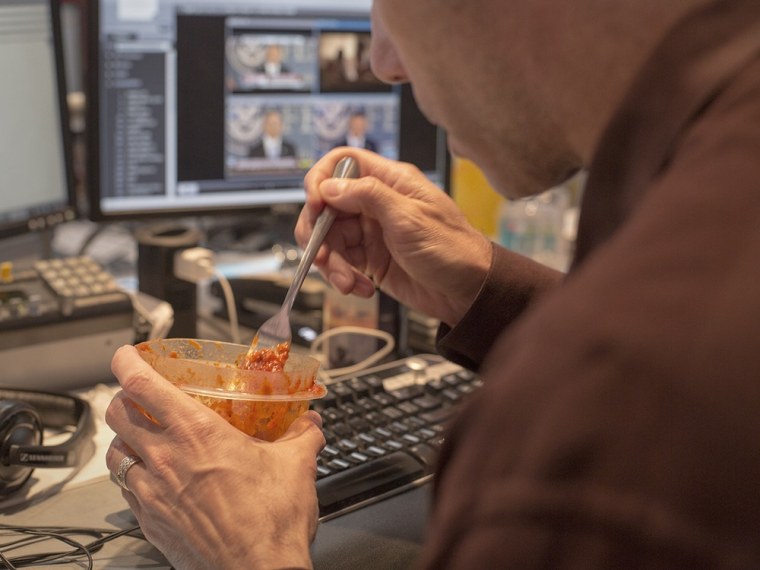You may be better off working through lunch than going out to eat with your co-workers — especially if getting away from the office wasn't your idea.
A new study finds that lunch time is more refreshing if people get to choose what they want to do, and less refreshing if they feel pressure to do something. That’s even true if it’s something that seems fun, like eating out with colleagues.
That seems to fly in the face of the idea that it’s good — if not always a possible — to leave the cubicle farm at lunch. John Trougakos, an associate professor at the University of Toronto’s Rotman School of Management and a co-author of the study, said they found that what’s really important is whether you feel like you can choose what to do at lunch time.
“When we have control over what we do, it’s less taxing to us,” Trougakos said.
Some people may love spending an hour with co-workers over lunch. But others may feel like the pressure to socialize, especially with your boss or colleagues, is just more work.
“We didn't find socializing to be the best thing to do during your break unless people were wanting to do that,” he said.
In addition, he said, “It wasn't bad to be able to work if that’s what they really wanted to do.”
Trougakos and his colleagues collected more than 800 surveys over a two-week period, tracking the lunch time activities of administrative employees at a university. Then, they asked those workers’ colleagues to rate how fatigued the workers were at the end of the day.
The researchers found that workers were least fatigued at the end of the day if they got to relax during lunch. But if they either worked or socialized during lunch, the stress was mitigated if they felt like it was something they wanted to do.
In other words, some people may prefer a lunch date with their desktop computer to one with their colleagues — and be better off for it.
That doesn't mean it's smart to stay chained to your desk all day. Even if you love your job so much you can barely tear yourself away at lunch, Trougakos said you are still likely to be more productive if you can spend at least a bit of the traditional lunch hour thinking about something other than work.
“We have the misconception that when people take a break they are slacking,” Trougakos said.
In fact, he said, breaks can make people healthier, more productive and less likely to burn out.
The bad news is that many workers these days probably don’t feel like they have much control over what they can do at lunch.
Thanks to the weak economy, lots of people don’t feel like they have time for a lunch break, while others may fear that if they take a break they won’t be perceived as hard workers.
Others may work in an office where managers think they are doing a good thing by pushing colleagues to bond through team lunches, but that good-intentioned effort can backfire.
Federal laws do not require employers to offer lunch breaks, although some states have regulations requiring meal breaks after a certain number of hours.
Trougakos noted that lunch breaks seemed to be more formalized back in the days when more jobs involved physical labor or manufacturing work. These days, many people’s work is primarily mental rather than physical, and Trougakos said people may not realize they need a break.
“Psychologically, it’s a different process,” he said. “It’s harder to tell when we’re becoming worn out by our job. We don’t really pay as much attention.”
Allison Linn is a reporter at CNBC. Follow her on Twitter @allisondlinn or send her an e-mail.
